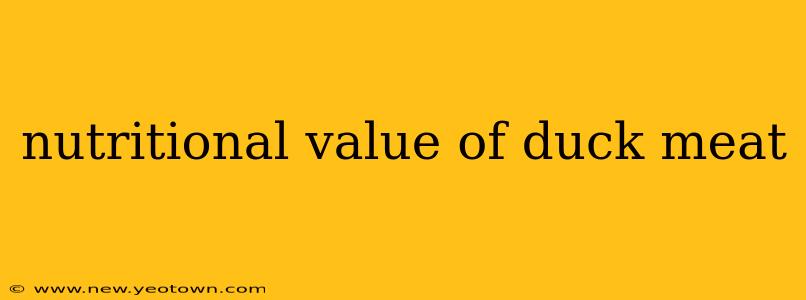The Delicious and Nutritious Truth About Duck Meat: More Than Just a Fancy Dinner
Duck. The word conjures images of elegant dinners, crispy skin glistening under the lights, and rich, savory flavors. But beyond its culinary appeal lies a nutritional powerhouse often overlooked. Let's dive into the surprising nutritional value of duck meat, separating fact from fiction.
This isn't just another run-of-the-mill poultry profile; we're going beyond the basics to uncover the unique nutritional benefits and address common concerns. So, tuck in and discover why duck deserves a prominent place on your healthy eating plate.
Is Duck Meat Healthier Than Chicken?
This is a frequently asked question, and the answer isn't a simple "yes" or "no." Both duck and chicken offer valuable protein, but their nutritional profiles differ. Duck tends to be higher in fat, particularly saturated fat, than chicken breast. However, this fat also contributes to its rich flavor and contains beneficial fatty acids like oleic acid (also found in olive oil), which can be beneficial for heart health in moderation. Chicken breast, on the other hand, is generally leaner, boasting a lower calorie and fat content. The healthiest choice depends on your individual dietary needs and preferences. Choosing lean cuts of duck and preparing it healthily can significantly mitigate the higher fat content.
What are the Nutritional Benefits of Duck Meat?
Duck meat is a fantastic source of high-quality protein, essential for building and repairing tissues, boosting metabolism, and supporting overall health. It's also a good source of several essential vitamins and minerals, including:
- Iron: Crucial for oxygen transport throughout the body. Duck meat contains a significant amount of heme iron, a more readily absorbed form than non-heme iron found in plant-based sources. This is especially beneficial for individuals at risk of iron deficiency.
- Selenium: A powerful antioxidant that protects cells from damage caused by free radicals.
- Vitamin B6: Plays a vital role in brain development, immune function, and red blood cell formation.
- Niacin (B3): Contributes to energy metabolism and healthy skin.
- Zinc: Supports immune function, wound healing, and cell growth.
How Does Duck Compare to Other Meats in terms of Nutrition?
Compared to red meats like beef and pork, duck generally offers a lower fat content, especially when lean cuts are selected. However, red meats often provide a higher concentration of certain vitamins and minerals like Vitamin B12. Compared to chicken, as mentioned earlier, duck is higher in fat but richer in certain micronutrients. Ultimately, a balanced diet incorporating a variety of protein sources is key to optimal health.
Is Duck Meat High in Cholesterol?
Yes, duck meat contains a higher amount of cholesterol compared to chicken breast. However, the impact of dietary cholesterol on blood cholesterol levels is a complex issue, and current research suggests that for many people, dietary cholesterol's effect is less significant than previously believed. Focusing on overall dietary fat intake and maintaining a balanced diet remains crucial for managing cholesterol levels.
How Can I Prepare Duck Healthily?
Preparing duck healthily involves mindful cooking techniques:
- Choose lean cuts: Opt for breast meat rather than legs and thighs, which tend to be fattier.
- Trim visible fat: Before cooking, remove excess visible fat from the duck meat.
- Healthy cooking methods: Grilling, baking, and roasting are healthier alternatives to deep-frying.
- Portion control: Be mindful of your portion sizes to manage calorie and fat intake.
In conclusion, duck meat offers a unique nutritional profile with valuable protein and several essential vitamins and minerals. While higher in fat than some other poultry options, responsible consumption and healthy cooking methods can make duck a delicious and nutritious part of a balanced diet. Remember, moderation and variety are key to a healthy eating plan.

